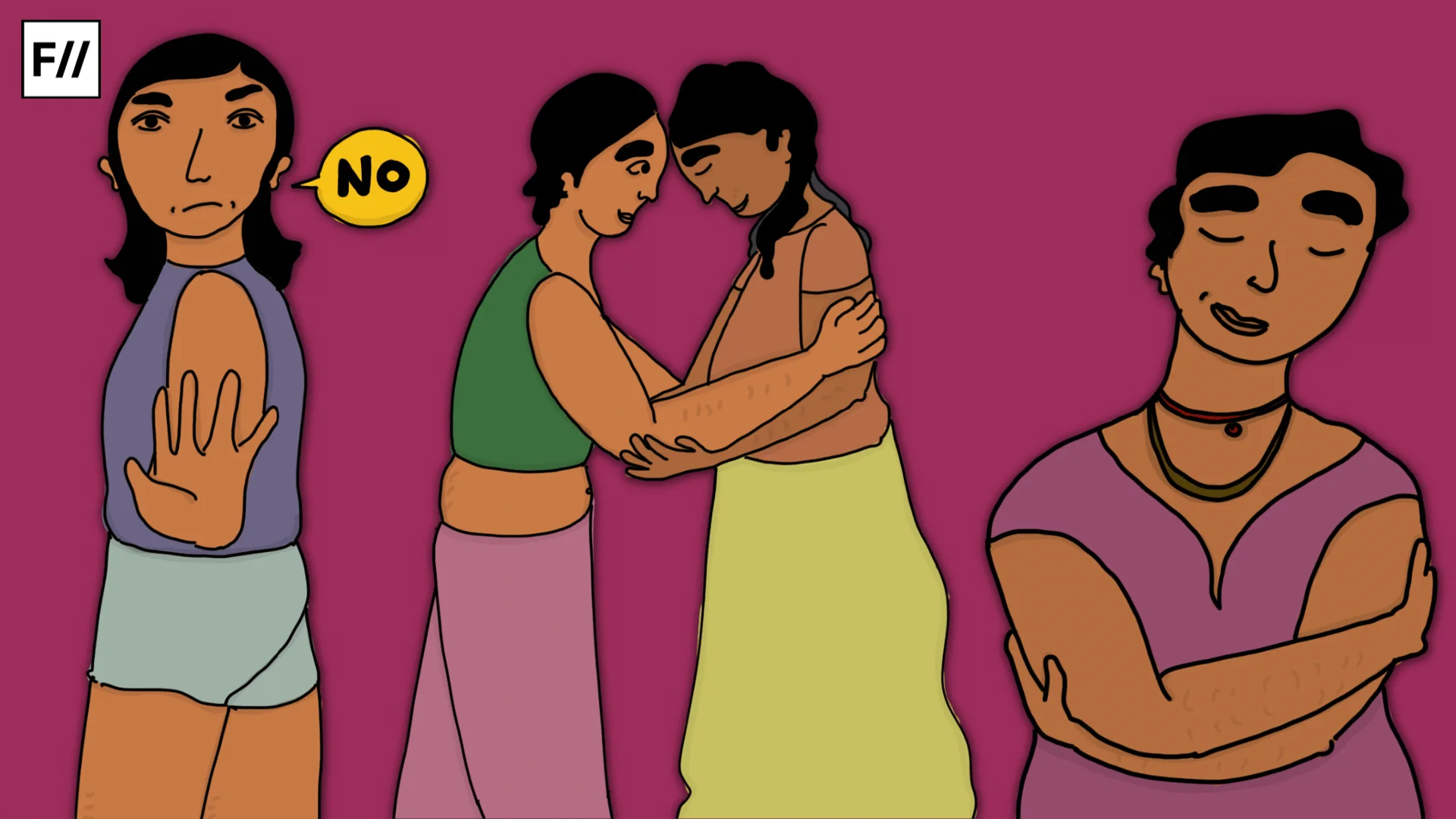Editor’s Note: This article is part of a campaign titled #JustNotInterested, run jointly by Feminism in India and Tinder India, to unpack and understand consent, disinterest and expectations in relationships. The campaign curates conversations on Instagram stories on various facts of modern relationships. This article is based on one of those conversations.
A friend of mine dated a guy for over a year, until one day she told me, “I don’t think this is working out. He wants to be serious about the relationship and I am still figuring out my life.” The next day she met him at a restaurant and explained why she could not date him anymore. They broke up and the guy waited for her to change her mind. With time, he moved on and so did she.
I come from the suburbs of Chennai and I grew up watching relationships that began with proclamations of love and ended with reasons of “My parents won’t agree to this.” So when my friend said she wanted to break up because she did not think she could be serious, I was shocked. We all know or have been part of stories that have not had ‘togetherness’ and reflecting back at my friend’s relationship, I could not be prouder.

Relationships are always a complex space to be in. Whether it’s a first date, a “situationship”, a casual fling, or even a marriage, they constantly involve negotiations, compromise and communication. We often find ourselves at difficult crossroads, considering compromising on something that we assumed was a non-negotiable. Sometimes, we compromise, and sometimes, we struggle to find a way out of it.
But there is no one formula for maintaining a healthy relationship. We are different people, having different stories and experiences. It would unfair to categorise multitudes of relationships under one blanket. I believe, however, that all relationships require communication and transparency at every stage. Being able to express what you feel comes with baggage and perhaps, a bad aftertaste. But what is equally important to love is respect, and respect is earned only through honesty.
Also read: Turning Someone Down: Is Amicable Rejection Possible? | #JustNotInterested
FII conducted an Instagram chat asking people about their experiences in relationships with mismatched expectations – when one partner wanted to keep it casual, or be physically intimate only, while the other wanted something more committed and emotionally bound. There were a plethora of responses reinstating the need and importance of communication. One respondent said, “My girlfriend always told me that she cannot promise me anything about the future which was quite sensible and far from debatable. Although, it did hurt me when she eventually broke up with me, I was happy that she never lied to me about her intentions with the relationship. We are great friends and I have the nicest memories of her.” Honesty in one’s expectations from a relationship can help ease the pain of the end of a relationship, without the usual accompaniment of resentment and anger.

The flip side to this is the insecurity and doubt that comes with the lack of communication. One of our respondents, who is in a relationship with a man who does not want to emotionally commit to her said, “I do not know how to deal with this. It comes with a lot of insecurity that he will find someone who is better than me, complex issues like I am not good enough for him and sadness is a constant feeling. I have decided that I will eventually stop talking to him and staying away.”
Love, for some, comes with the need for exclusivity, and when your partner is unable to be exclusive, it hurts. We have all had people we fear losing and by overthinking, we start doubting ourselves. It is very important to evaluate if your partner is being open about their feelings. If you find that they are not glossing over what they feel and being clear about their expectations from the relationship, then it is your responsibility to respect their decision. At the same time, make sure you are not getting hurt by questioning your self-worth. One can have many reasons for not wanting to commit, and it is very often not about a specific partner at all!
Honesty in one’s expectations from a relationship can help ease the pain of the end of a relationship, without the usual accompaniment of resentment and anger.
When mismatched expectations occur, many respondents, like the one above, mentioned that they would want to nip the conflict in the bud and stay away until the person that is emotionally affected by it moves past it. As one respondent quipped, “If the frequency doesn’t match, change the channel. Or else, you are stuck with two stations trying to make music but are just making noises. You just need to accept the situation, simple!” It is often the healthiest decision to step away from a situation that we feel compromises on our fundamental desires from a relationship – whatever the nature of that relationship may be.

The space to express oneself freely determines the strength of a relationship. It does not have to be alike and certainly does not have to be something that both parties agree upon. Expecting that our thoughts, feelings and emotions will be mirrored by our partners can lead to a lot of conflict, and also erases the individuality of both partners. If differences of expectation are communicated in a way that both partners are comfortable with, they can continue to have a healthy relationship. But this is not always the case.
One of our respondents wrote, “I thought it was best to end everything. [There were a] lot of tears from the other side and not to mention, emotional blackmail and constant bickering by his friends on how could I do this to their friend – a lot of drama because I did not want to get physical. But I decided my mental peace and happiness was greater than anything. Let him think that I am a small person, I do not care.”
Also read: Why Is ‘No’ Such A Bad Word In Relationships? | #JustNotInterested
Compromises should not dissolve your agency and that which is important to you. A relationship should never become a burden or a mandate one is forced to carry on with because you committed (or didn’t!) to being with someone. Sex is important in relationships – but the extent of its importance must be mutually decided by those in the relationship. Bullying your partner, badmouthing them and unnecessary gimmicks like the one mentioned above reeks of the devaluing of consent and mutual respect within relationships.

A clearly communicated desire for a casual relationship however, is not to be vilified. One respondent talked about how she was not sure about her feelings for her long-term partner, the one everyone expected her to get engaged to. “I just want people to know that they’re not cold-hearted bitches for being somewhat indifferent.” The constant glorification of romantic happily-ever-after love in our culture makes it easy to view those who are non-committal, or just looking for physical intimacy, with suspicion and disrespect. But as long as one is upfront about these expectations, there is no cause for judgment.
It is often the healthiest decision to step away from a situation that we feel compromises on our fundamental desires from a relationship.
Again, there is no one way of being in a relationship. There is no formula or a rulebook. Each relationship has its own struggles, and the mismatched expectations of commitment vs casual sex is a frequent thorn in the side of many relationships. But it is within our grasp to prevent them from turning sour. It is okay to feel uncomfortable with the pace of a relationship, and it is important to express this discomfort to your partner. It is pertinent to remind ourselves time and again that we need to value ourselves over the other person, while keeping in mind that it is not their fault for having different expectations. Talk. Communicate. Express. These are the only commonalities in the myriad types of relationships there exist.
Featured Image Source: Time.com
About the author(s)
Divya Krishnamoorthy loves listening to stories and believes that we are all stories who stay alive only through narration. She is a Masters student in English at Ambedkar University, Delhi. When she is not writing her papers, you will definitely find her having one of her weird reveries.




